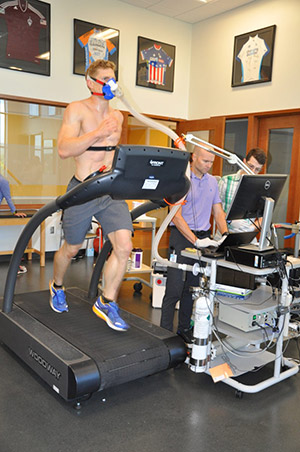
As an exercise physiologist, I have the opportunity to work with some of the top athletes in the world; in their respective sports. If there is one thing I learned, it’s that the very best do a little extra.
Here are some examples of the ‘EXTRA’ in action:
Supportive Flexibility and Soft Tissue Care for Swimmers
Recently I spent a week assessing the physiologies of a World Champion 100 meter Freestyle Swimmer and a couple of his world-class training partners. Yes, they spent a lot of time in the water but what impressed me most was their supplemental training. For instance, before every swim they engaged in a very extensive flexibility and soft tissue routine using foam rollers, yoga mats and massage tools. They made a very comprehensive pre-swim routine look completely natural.
Metabolic insight to maximize mountaineering training and expeditions
Over the last couple of years I have seen an increasing number of Mountaineer Athletes with the goal of optimizing their metabolism to utilize fat and manage lactate better. These two highly important physiological factors can be crucial in helping athletes conserve carbohydrates on long expeditions and keeping muscles fresh for crux moves high on the mountain. This is especially vital when climbing a new route on Everest without oxygen or going for speed ascents on mountains like Denali.
Base Endurance Training and the CrossFit athlete
With 10-30 minute contests that typically involve rotating through multiple strength or power moves, gymnastic exercises and sprints, it wouldn’t seem that CrossFit athletes would need to prioritize endurance training. However, some of the top CrossFit athletes in the world do physiological testing for this very reason. They’ve learned they can train the slow twitch muscle fiber system to clear or metabolize lactate (a product of carbohydrate metabolism) better. Athletes with lower blood lactate will perform better on repeated high-intensity strength and power moves. This is because lactate in the blood associates with hydrogen ions which will lower the pH and cause an acidosis that will interfere with muscle contractions and give us that burn we feel during high-intensity efforts.
In addition, aerobic adapted CrossFit athletes can rely more on the fatigue-resistance slow twitch muscles to help out with moderate intensity efforts. Low- intensity endurance training will also enhance cardiac function, improve diffusion of oxygen and fuel into the muscle which are all important attributes to both high and low-intensity efforts. CrossFit games often have running, cycling, rowing, swimming or SUP endurance events where the lower intensity base level training becomes even more important.
Whether you’re playing soccer, competing in Ironman Triathlon, getting ready for a pickleball tournament, 100 mile Mountain Bike etc… let’s put a little EXTRA into it! What do you do for your EXTRA? Make sure to comment below.


